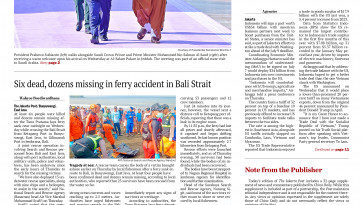OP ED -OPINION-EDITORIAL: MANILA- PH plays vital role in COP26 on mitigating climate change
PH plays vital role in COP26 on mitigating climate change
ADVERTISEMENT
 The 26th Conference of the Parties COP26) to the United Nations Framework Convention on Climate Change opened in Glasgow, Scotland last Oct. 31 for a two-week meeting that would hopefully address global concerns on the continuing threats posed by unabated global warming.
The 26th Conference of the Parties COP26) to the United Nations Framework Convention on Climate Change opened in Glasgow, Scotland last Oct. 31 for a two-week meeting that would hopefully address global concerns on the continuing threats posed by unabated global warming.
UN Secretary General Antonio Guterres reiterated that unless drastic action is taken, the world is heading toward a “calamitous” 2.7 degrees Celsius increase in global warming. This is based on the current Nationally Determined Contributions that parties to the COP21 Paris agreement made six years ago. The G20 nations that represent 80 percent of the emissions need to demonstrate concrete action to reduce global emissions by 45 percent by 2030. At the 2009 Copenhagen climate summit, the G20 nations committed to mobilize $100 million annually to stem the tide of global warming – and this commitment remains unfulfilled.
After a long absence, the United States headed by President Joseph Biden is fielding a top-level delegation made up of more than a dozen Cabinet members in stark contrast to former President Donald Trump’s rejection of the Paris agreement.
Climate finance is the rallying point among the emerging economies like the Philippines that are minimal contributors to carbon emissions yet suffer the most from typhoons and other natural disasters triggered by global warming. Given the harsh economic impact of the coronavirus pandemic on the climate vulnerable countries, they are likely to exert greater pressure on the wealthier nations to deliver on their long-delayed commitments.
Finance Secretary Carlos Dominguez III, who has been designated by President Duterte to lead the government’s climate change commission, is heading the Philippine delegation to COP26. He will likely team up with leaders of other delegations from the Climate Vulnerable Forum in asserting the need for the wealthier nations to allocate significant amounts toward adaptation and resilience programs that would mitigate the harmful consequences of global warming. Prior to leaving for Glasgow, he declared:
“We need the Western countries to take responsibility for having contributed and continue to contribute the most to greenhouse gas emissions. They must be given the greater burden of paying for the grants, investments, and subsidies needed for the most climate-vulnerable countries to mitigate the effects of global warming.”
He will also present the Philippines’ Sustainable Finance Roadmap, a blueprint that suggests concrete pathways for enabling the financial sector to mainstream climate change programs. This dovetails with the advocacy of environmental, social and good governance (ESG) programs by the country’s banking and finance sector in support of business and industrial initiatives.
Earlier this year, the Asian Development Bank launched the ASEAN Catalytic Green Finance Facility (ACGF) Green Recovery Program to support $4 billion worth of green infrastructure projects. The program will help Southeast Asian countries “design green stimulus packages and projects that will create climate-friendly jobs, boost economic growth, and help countries fulfill their pledges under the Paris Agreement to reduce greenhouse gas emissions.”
Beyond COP26, sustained efforts are needed to ensure that the country is shielded from the disastrous effects of global warming and climate change.












